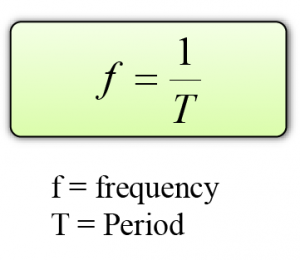- Waves are formed by a series of oscillation.
- In order to understand waves, we must understand oscillation.
Technical Terms Related to Oscillation
- An equilibrium position is a point where an oscillating object experiences zero resultant forces.
- A complete oscillation occurs when the vibrating object:
- moves to and fro from its original position and
- moves in the same direction as its original motion.

- Amplitude is the maximum amplitude of an object from its equilibrium position. The SI unit for amplitude is meter, m.

- The greater the amplitude, the greater the mechanical energy possessed by the oscillating system.
- Period is defined as the time required for one complete oscillation or vibration.
- Frequency, f is the number of oscillation that takes place in one second. The SI unit for frequency is Herz (Hz).
- Frequency can be related to the period by the following equation

Example:
Given that a pendulum makes 20 oscillations in 25s. Find the frequency of the pendulum.
Answer:
Period,

Frequency





nice~thx you
what is the meaning T f= 1 1.25 =0.8Hz? i cant understand T.T